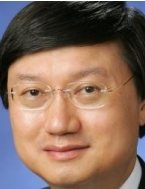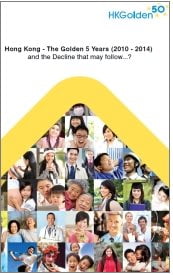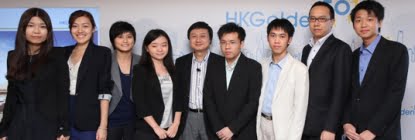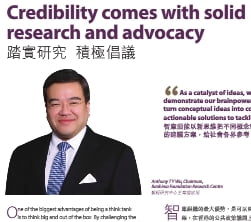“In the next five years, Hong Kong will enjoy some of the strongest business opportunities and inflows of talent in its history. If Hong Kong people think through the issues calmly and sensibly, we can capture these and enhance the long-term growth and quality of our economy, thereby supporting jobs and fostering social harmony for the next generation. If we choose to do nothing and allow these opportunities to disappear, we may well regret the decline that may follow the ‘Golden Five Years’. Our younger generation, in particular, should be more proactive in changing to a pro-growth mindset in the Golden 5 Years, as what they choose will likely define their next 50 years.”
 These are the thoughts, or at least the pre-speech blurb, of Franklin Lam. After a career leading UBS’s property research and asset management, Lam founded a sort of think-tank in June called HK Golden 50. Its mission is to spread his big idea about how Hong Kong’s next five (or by now four) years will define the next 50. He has also been doing public speaking, and on Monday it will be the turn of the Foreign Correspondents Club.
These are the thoughts, or at least the pre-speech blurb, of Franklin Lam. After a career leading UBS’s property research and asset management, Lam founded a sort of think-tank in June called HK Golden 50. Its mission is to spread his big idea about how Hong Kong’s next five (or by now four) years will define the next 50. He has also been doing public speaking, and on Monday it will be the turn of the Foreign Correspondents Club.
Looking at the youthful line-up of Lam’s think-tank, we see something rather familiar: the (mostly) bright-eyed and eager but distinctly callow look of neophyte research assistants and aides. Where have we seen it before?
Yes, of course: it’s the kids hanging around legislator Regina Ip’s own Savantas Policy Institute. And the younger participants at a Bauhinia Foundation (‘solid research and advocacy’) dialogue session. And, indeed, probably the Young Democrats and the Young Democratic Alliance for the Betterment Etc of HK as well. It looks suspiciously like yet another proto-political party hastily assembled by a sage surrounded by junior underlings.
Whether Franklin Lam has ambitions in that direction or not, he stands out among much of the  political and quasi-political crowd in one way: he gets property. While Regina Ip, as Security Secretary, was overseeing and fleeing the Article 23 mess, Lam was monitoring Hong Kong’s real estate market, forecasting as early as the third quarter of 2003 that a housing shortage was going to come. At that time, he saw it as reason to recommend that stock investors buy developers, who stood to gain an extra 35% profit by ‘rationing out stock’.
political and quasi-political crowd in one way: he gets property. While Regina Ip, as Security Secretary, was overseeing and fleeing the Article 23 mess, Lam was monitoring Hong Kong’s real estate market, forecasting as early as the third quarter of 2003 that a housing shortage was going to come. At that time, he saw it as reason to recommend that stock investors buy developers, who stood to gain an extra 35% profit by ‘rationing out stock’.
The research report describing the Golden Five Years thesis foresees spiraling GDP, rents and visitor arrivals, and a record labour shortage up to 2015. With the rest of the planet going down the tubes, this might seem – to put it politely – contrarian. Then again, Financial Secretary John Tsang has just warned that the Hong Kong economy is in for a bad time, and we all know how right he is about these things.
HK Golden 50’s optimism is based on three factors:
- Psycho-demographics – Hong Kong’s 45-55-year-old bulge, the most open-minded and caring segment of the population (in all modesty), is approaching maximum decision-making potential and will produce brilliant public policy.
- More Mainlanders – ‘Torrential’ growth in Mainland visitors, home-buyers and service industries will take place – after apparently lagging artificially these last years – attracting yet more inflows from other parts of the world. (I can’t wait.)
- More overseas companies – The shift in global economic power from West to East will draw a big inflow of businesses from elsewhere, with obvious repercussions for office rents and lower-value activities.
Wild-eyed soothsaying or visionary guesswork? The research draws on government data, but you get the impression that – in time-honoured think-tank fashion – the facts were chosen to support the conclusion. They all do this. Regina Ip’s people decide that we need Singapore-style trendy tech-sounding industrial policy. Anthony Wu’s Bauhinia mob agonizes over health-care finance and other euphemisms for keeping the bureaucracy’s reserves safe from the population. The HK Golden 50 report has no less credibility than this lot; what it really has, however, is an original and even shocking conclusion.
Franklin Lam’s point is that Hong Kong has to embrace rather than resist these inflows of people, money and business. And in order to do that it needs to make enough space available – through reclamation if necessary – for a serious expansion of housing stock, office space, retail capacity, hotels, hospitals and schools. (The report also notes the current trend whereby the expansion of luxury shops and influx of Mainland mothers is simply squeezing out locals and creating disharmony.) If our officials read only one sentence of the report it should be this: “All new space is good for job-creation.”
Oddly, the report suggests that the younger generation’s lack of a can-do spirit is a major barrier, while it goes easy on the government’s tycoon-oriented land policy. Maybe this is because Lam’s basic argument, which is not entirely new, is not one our policymakers have any time for, and he feels it is diplomatic to point the finger elsewhere.
Essentially, it comes down to this: the government and property tycoons should stop trying to maximize margins by keeping space in short supply and let the rest of the community benefit from expanding volumes instead.
Which begs the question Lam is certainly too polite to ask: who is Hong Kong really being run for?



The girls look cheerful and bright-eyed, alright. But it seems that the boys aren’t totally convinced that the golden years are finally upon them. And the one in the white jacket is actually the copier-service technician who just happened to be in the office.
I think we’re heading for a big recession, time soon to divest stocks. As to the think tank, I heard Leung Kah-kit speak recently, he must have read Hemlock’s book. He too was talking about the despair of the post 80’s/90’s generation in working hard to end up with a low paying job, servicing a loan on a rabbit hutch in the NT. This is a reality ignored by the doofi in our think tanks. Funny how the fucking obvious about cartels and how this affects all strata of our society never gets a ‘thought’ when they are tanking so to speak.
An impressive line up of ‘thinkers’ at Lam’s ‘think tank’. Several probably had to be told to remove their fingers from their nostrils before the photo was snapped.
Having had the misfortune of meeting most of the expat-dominated Lion Rock institute last year “letting their hair down”, I can’t see that this lot are any worse appearance wise. Most think tanks seem to be populated with research assistants that had careers in student politics with all the acne-riddled ugliness and social ineptitude that implies. The two on the left look eminently researchable though. And is Mr Lam wearing a hairpiece? His hairline looks rather suspicious and unnatural to me.
Everyday, I work with notionally smart/talented kids who suffered HK education and who look to the lips of their elders for spittles of wisdom to regurgitate because they are largely incapable of original thought. My guess is the mediocre bunch in the photo are heavily mentored into their views on any particular topic.
#6 has the demeanour of a sex criminal.
Wait, you mean artificially making land insanely expensive to benefit a few oligarchs hurts business growth? For shame sir!
These are the best and funniest comments on a Hemlock column for a long time. Trebles all round!
@oddsox: the second from the left is the most researchable, IMHO. #7 obviously didn’t read the “dress in black” memo and arrived straight from work in his waiter’s jacket. And as for Franklin “Wiggy” Lam, I think you might be right.
But, still, he looks a lot less like a toad than Anthony Wu – you can just imagine a fat sticky tongue darting out from Anthony Wu’s smug face to snare a passing fly, or possibly a large pie of some sort.
Anyway, I digress, more research on #2, please!
I don’t really understand all the worrying about the future of Hong Kong. In the words of Joe Studwell in Asian Godfathers, “Hong Kong and Singapore were destined to succeed. All they had to do was to be one degree more efficient, one degree more attractive to capital than surrounding countries and they would prosper…A city state with a strategic deep water port in a region that has relatively higher levels of mismanagement, corruption and political uncertainty will prosper with little reference to official economic philosophy.” It’s hard to see that changing much…